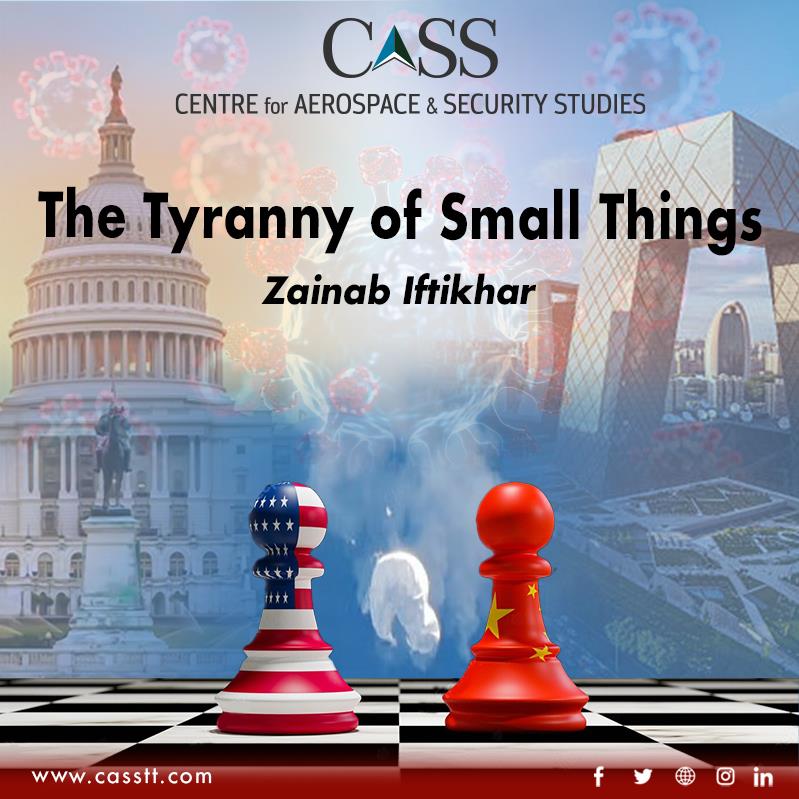The small apples of discord between the two rival powers United States (US) and China are piling up causing growing concerns about the possibility of a larger conflict. Their impact is raising the question: Is there a new Cold War in the making? The latter is worrying because the two countries account for more than 43% of global economic production. Countries, which rely heavily on both are understandably more concerned about the escalating tensions between the two superpowers.
Recently, tensions spiked because of an alleged Chinese spy balloon, which entered Alaska, floated over Silos in Montana, and advanced towards the East Coast. The balloon threw the defence apparatus into action and was shot down by US Air Force in response. The balloon, as claimed by the US administration, was a ‘violation of international law’ and was part of a wider Chinese surveillance balloon programme. The Chinese government, on the other hand, asserted that the US ‘overreacted’ to a weather monitoring craft meant only for research and labelled it a ‘symbol of American decline.’ Beijing also said that their actions were an ‘indiscriminate use of force over a balloon’. The matter escalated quickly and US Secretary of State Antony Blinken postponed his planned visit to Beijing, which was intended to precede the Biden-Xi Summit.
A glaring sign of a return to the Cold War era is the US strategy which is to impede China’s future economic and technical advancement. A striking instance of this was the Department of Commerce’s announcement in October 2022 of a ‘ban on the export of advanced semiconductors to China’. Denying China’s military and surveillance state access to cutting-edge computing and Artificial Intelligence is indicative of a brewing tech battle between the two.
On the other hand, the war of words between the US and China is also exacerbating tensions. President Xi’s recent statement during the ‘Two Sessions’ accused Western countries, led by the US, of implementing containment, encirclement, and suppression of his country, posing severe challenges to its development. These were surprisingly severe remarks by President Xi as they implicitly referred to the US as an adversary. Around the same time, Mr Qin Gang, the former Chinese Ambassador to the US, voiced a stark warning to the US about the ‘catastrophic consequences’ of a ‘reckless gamble’ by Washington. Gang echoed Xi’s statement by saying, ‘If the United States does not hit the brakes but continues to speed down the wrong path, no amount of guardrails can prevent derailing, and there will surely be conflict and confrontation.’ The harsh rhetoric is deepening differences that may create further obstacles for both countries to negotiate a long-term solution for peaceful co-existence.
Propaganda and cyber warfare have also played a central role in fracturing their ties even more, especially during global crises. In the past, both countries have used propaganda to blame each other for the origins of the COVID-19 pandemic. For example, the US accused China of spreading media speculation that the Coronavirus originated in a lab at Fort Detrick, a Maryland military base. Former US President Donald Trump referred to it as the ‘Chinese virus’, which was seen as stigmatizing and perpetuating anti-Asian sentiment. The US Justice Department also alleged that China was backing hackers targeting research facilities developing the COVID-19 vaccine. Meanwhile, China accused the US of practicing neo-colonialism and exacerbating vaccine inequities that existed pre-pandemic.
These rival narratives reiterate that the US and China share one commonality: a deep distrust of one another.
Asia, amid this new Cold War, has resurfaced as a crucial pivot. Being proximate to the Chinese mainland, it has become a potential target for endeavours by Xi Jinping to increase Chinese dominance and power. Additionally, the majority of ASEAN nations already have varying degrees of economic interdependence on the PRC. The current American strategy towards China is not as overtly demanding as during the US-USSR Cold War when countries were expected to break off relations with the Soviet Union. However, the current American efforts are aimed at countering China’s influence and not so quietly, gaining support from Asian countries. For example, in November 2022, the Biden administration inaugurated the ‘Comprehensive Strategic Partnership’ with ASEAN, nearly a year after China formed a similar alliance with the organisation. While most ASEAN nations are trying to maintain strategic flexibility, continuous endeavours to pressurize them can have serious consequences for regional peace.
Clearly, the US and China are in a state of dissent. This necessitates crucial statesmanship as well as diplomatic and political acumen by both. Otherwise, this heightened ‘superpower conflict turned Cold War’ would surely cause difficulties for countries which are strategically dependent on them; as well as for resolving global issues, for which the two countries need to be on the same page.
Zainab Iftikhar is a Research Assistant at the Centre for Aerospace and Security Studies (CASS), Islamabad, Pakistan. She can be reached at cass.thinkers@casstt.com.




